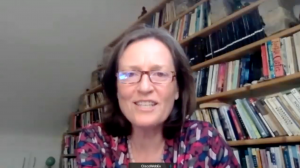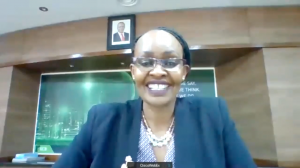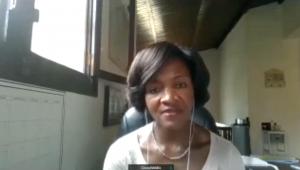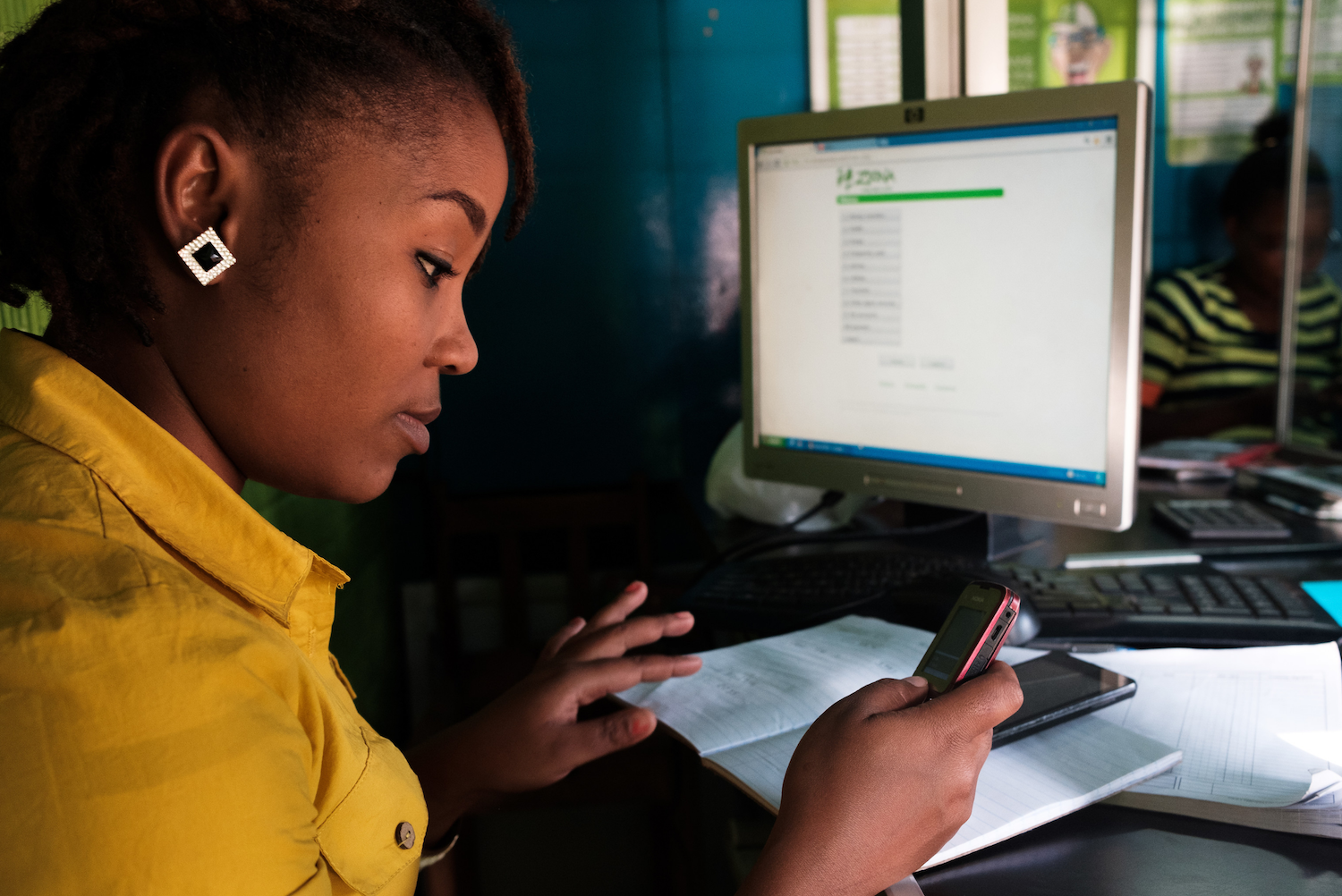A lot has been done in recent years to unlock financing for women-led businesses in developing countries. As governments and businesses are looking to address the economic challenges caused by COVID-19, digital financial solutions and platforms can be an untapped source for access to finance and government support to women-led SMEs (WSMEs).
In the second WE Talks, organized by We-Fi in collaboration with the Financial Alliance for Women, the discussion focused on how the COVID-19 crisis can accelerate the shift to digital financial services and build capacity of women to change to new forms of payment and new markets.
In case you missed this webinar, please see the key takeaways below. You can also watch the full recorded session here:
Introducing this second WE Talks, host Wendy Teleki, Head of the We-Fi Secretariat, noted that access to finance is at the heart of We-Fi’s work as 70% of women-led SMEs are underserved by financial institutions and ‘digital financial services are an enabler for women in many ways’.
“Pre-Covid, digital has become more prevalent but women still lag in access to mobile devices and internet”, noted Teleki. “We-Fi’s recent call for proposals for our new round of financing from our Implementing Partners included digital finance and digital transformation as one of our key themes”.
“By focusing on this component, we hope to increase the digital financial service offering by banks and fintech providers and the resilience and adaptability of women entrepreneurs”, she added.
 Co-moderator Inez Murray, Chief Executive Officer of Financial Alliance for Women started by saying their 60 members banks are acting on a number of fronts to support SMEs and preserve the economy. “Some of the examples to guarantee business survival are: easing of credit terms, often accompanied by government support; reduction or no transaction fees; payment suspensions, support to encourage savings; and ramping up the efforts to increase individual’s digital connection”, according to Murray. The moderator highlighted how relevant it was to hear examples from Kenya, which stood at the cradle of digital financial services in Africa and with an economy highly exposed to the SME sector.
Co-moderator Inez Murray, Chief Executive Officer of Financial Alliance for Women started by saying their 60 members banks are acting on a number of fronts to support SMEs and preserve the economy. “Some of the examples to guarantee business survival are: easing of credit terms, often accompanied by government support; reduction or no transaction fees; payment suspensions, support to encourage savings; and ramping up the efforts to increase individual’s digital connection”, according to Murray. The moderator highlighted how relevant it was to hear examples from Kenya, which stood at the cradle of digital financial services in Africa and with an economy highly exposed to the SME sector.
Murray cited a Bankable Frontier Associates survey from April 11th which shows that over 80% of respondents in Kenya reported decreased incomes and the expectation of significant adverse effects on financial well-being.
Kenya: an increase of 68% in mobile banking transactions
 Annastacia Kimtai, Director of Retail Banking at KCB Bank Kenya, started her comments under this somber context. KCB Bank is the largest and most profitable bank in East Africa with over 22 million customers. It has been innovating in particular with financial products for WSMEs introducing cash flow-based lending, easing collateral requirements which are traditionally based on land or property titles.
Annastacia Kimtai, Director of Retail Banking at KCB Bank Kenya, started her comments under this somber context. KCB Bank is the largest and most profitable bank in East Africa with over 22 million customers. It has been innovating in particular with financial products for WSMEs introducing cash flow-based lending, easing collateral requirements which are traditionally based on land or property titles.
She explained how digital finance has taken a flight since the start of the pandemic. “Customers are migrating to digital platforms with an increase of 68% in mobile banking transactions and 89% in internet banking” said Kimtai. The use of credit or other types of payment cards has also increased significantly, with expenditures concentrated in food, groceries and healthcare, usually under the management of women. This means funds which initially would flow into women’s businesses are now being deployed to sustain the family.
Download the speakers’ presentations here:
Annastacia Kimtai: Business community agile response to COVID-19
She continued that the main sectors impacted by the pandemic are tourism, hotel industry and hospitality, all sectors in which women are heavily employed. “Government is stepping in by reducing tariffs and taxes: the turnover tax decreased to 1% (from 3%); corporate tax to 25% (from 30%) and VAT to 14% (from 16%). The Central Bank of Kenya reduced its reserve requirements and borrowing rate, easing financial loans that could be directed to WSMEs.”
KCB Bank is aiding their 100,000 WSME customers by restructuring loans principal and interest payments through a moratorium of to up to one year, depending on the business segment and reducing transaction fees.
Non-financial support is coming in the form of webinars and online training offers to help women entrepreneurs with business survival skills and resilience, added Kimtai. Digital finance has helped women-led SMEs to access new e-commerce markets, stimulated by social distancing rules. Kimtai said that her bank currently has a facility that will become a marketplace in the next few months.
Mobile money agents can provide key data
 Florence Boupda, Manager of New Business of the Financial Institutions Group in West and Central Africa at IFC (World Bank Group) gave a comprehensive overview on the impact of the pandemic on SMEs in the region, and IFC’s response. The IFC Banking on Women Program provided since 2014 over $2 billion to many financial service providers around the world to support WSMEs. “As the crisis unfolds and countries are slowly emerging out of lockdown, the recovery is expected to take time, but we can work to accelerate finance to WSMEs”, stated Boupda.
Florence Boupda, Manager of New Business of the Financial Institutions Group in West and Central Africa at IFC (World Bank Group) gave a comprehensive overview on the impact of the pandemic on SMEs in the region, and IFC’s response. The IFC Banking on Women Program provided since 2014 over $2 billion to many financial service providers around the world to support WSMEs. “As the crisis unfolds and countries are slowly emerging out of lockdown, the recovery is expected to take time, but we can work to accelerate finance to WSMEs”, stated Boupda.
Several instruments can be used to speed up the rollout of digital financial services. First, data by mobile money agents can be used to allow financial services providers to make credit decisions. Africa witnessed the highest growth in mobile money among all regions over the past years, representing now $450 billion in transactions, or 20% of the GDP of the entire continent.
The second point Boupda highlighted was the agriculture value chain. Women represent at least half of farmer ownership in Africa, producing 70% of consumed food. “This segment is projected to have a market value of 1 trillion US dollars in 10 years”, said IFC’s speaker. She detailed that harnessing the data of these WSMEs linked to the value chain and their payment information with their mobile money accounts can be very useful. This so-called AgriTech approach can help create credit scoring, performance scoring (productivity, farming habits) supporting partnerships between WSMEs and AgriBusiness in their value chain. The women are onboarded, capacity building is evaluated, and flows of supplies can be digitally recorded. In doing so, the digital financier can more easily extend finance to the WSMEs involved and more easily so then in the traditional banking sector.
“IFC has an initiative called Rural Finance Facility which focuses on the usage of digital data in order to help WSMEs and women farmers in particular access finance in the form of working capital, and longer term funding, representing true economic development”, Boupda added.
In the Q&A session with the audience details were asked about what the private sector needs from the government to continue its support to WSME during this crisis. Kimtai stated that the government is backing the private sector with critical policies and studying a potential guarantee for commercial bank loans. Such support helps the private sector to activate demand to re-start the economy. IFC has been instrumental in this discussion, added Kimtai from KCB Bank.
Boupda said that joint responses by the IFC and World Bank cover demands for support from the public sector as well as the private sector side; for example, the World Bank Group has been working with governments in establishing SME Guarantee funds and share international best practices in establishing such facilities.
In her conclusion, We-Fi’s Teleki emphasized how Africa continues to show innovations related to digital finance and the value of learning from these examples to respond quickly to the current crisis.
We-Fi will continue its webinar series on June 2nd (09:00 – 10:15 AM EST) with a session about What Works in Remote Training and Mentoring for Women Entrepreneurs. This webinar will be in collaboration with the Aspen Network of Development Entrepreneurs (ANDE).

